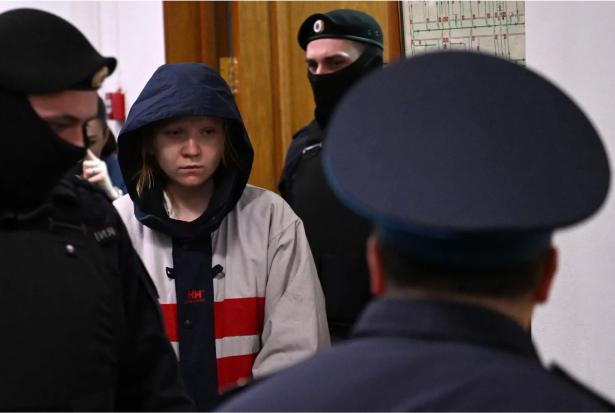On April 2, 2023, there was an explosion on the University embankment of Vasilyevsky Island in St. Petersburg. The victim of the terrorist act was the Russian military correspondent (or military commissar) Maxim Fomin, here working under the name of Vladlen Tatarsky. The authorities immediately declared feminist Daria Trepova the perpetrator of the crime, and her arrest was reported the next day.
Tatarsky was one of those who over the past year glorified violence, not just as a way to solve problems, but also as “what we love.” Like many other military correspondents, Tatarsky constantly criticized the Russian government for insufficient cruelty and an unwillingness to carry out the genocide of the civilian population of Ukraine, without which it was impossible to win the war or to consolidate the occupied territories. It was his opinion that all people of military age should be destroyed in Ukraine, though it would eventually be necessary to deal not only with them but also with immigrants from Asian countries who have been “flooding” Russia: “when we finish with them, we will immediately deal with this issue.”
Alas, once again the wave covered one of those who raised it himself. History is merciless in this regard. Whether we consider it karma or just a natural pattern, over and over again everything works in this way.
For a Western reader who is not familiar with the reality of Putin's Russia today, it is necessary to explain who the military correspondents are. The war that broke out in Ukraine was not only accompanied by a huge number of victims on both sides, but it gave rise to the emergence of a whole group of people publicly, legally and with the full support of the authorities, expressing ideas that two years ago would have been perceived as extremist. It should be noted that in Ukraine, too, many public figures cursed the Russians, which is quite understandable given the unfolding bloodshed. But Russian military correspondents are not just a group of embittered nationalists calling for the destruction of everything foreign, and especially Ukrainian. They act as a link between the official propaganda machine (which also does not hesitate to speak about Ukraine), “Wagner” mercenaries, and ultra-right groups inside Russia. Unfortunately for the right-wing forces, however, their rapid growth over the past months has begun to cause serious concern not only among the liberal and leftist opposition, but also among a significant part of the bureaucracy, the military, and the bourgeoisie. In an aggravated situation, when conflicts and the struggle for power are growing more and more frequent at the very top, the St. Petersburg explosion (regardless of who will be held responsible) could well be a kind of thing that puts the extreme right forces in government back in their true place.
However, yesterday's explosion has another, very specific feature that puts it in a completely different context. If the pseudonym of the deceased Mr. Fomen is clearly a reference to Vavilen Tatarsky, the hero of Pelevin’s famous novel Generation P, then the name of Daria Trepova, the girl accused of the attempt, makes us recall a most important historical episode that happened a century and a half ago, all in the same Petersburg.
In 1878, the revolutionary populist Vera Zasulich shot the mayor Fyodor Trepov. The official survived, and the jury, chaired by the famous lawyer A.F. Koni, unanimously acquitted the girl. This event, interpreted by some as a triumph of sedition, and by others as a victory for justice, marked the beginning of the era of revolutionary terror in Russia.
The mastermind of the St. Petersburg terrorist attack (if it was Daria Trepova at all) is clearly not, unlike Vera Zasulich, a lone revolutionary. This is too evident in the quality of workmanship; there were clearly professionals involved here. The explosion was strong enough to kill a war correspondent, but not so powerful as to cause accidental casualties and unnecessary destruction. It is hard to imagine that she could organize everything herself, make and conceal a bomb, and escape from the scene without any problems. At the same time, the suspect did not even try to escape from the city after the explosion, and the authorities almost immediately announced that they knew her name. All this looks at least strange. And it is not surprising that many commentators have already begun to speculate about the serious people or structures behind the murder of the military correspondent. The feminist suspect is very suitable for the image dictated by historical tradition, but does not correspond well to the “technological” circumstances of what happened. But whoever was responsible for the explosion on the Universitetskaya embankment of Vasilyevsky Island, there is a feeling that we have before us a completely Petersburg story, which will be analyzed and solved for a long time. One of two things is going on: either the masterminds of the terrorist attack have a very sophisticated historical and philological imagination, or we are dealing with the mystical “irony of history.”
No matter how further events develop, one thing is clear. In modern Russia, TNT is becoming the most convincing political argument.
Boris Yulyevich Kagarlitsky is a Russian Marxist theoretician and sociologist who has been a political dissident in the Soviet Union. He is coordinator of the Transnational Institute Global Crisis project and Director of the Institute of Globalization and Social Movements (IGSO) in Moscow. Kagarlisky hosts a YouTube channel Rabkor, associated with his online newspaper of the same name and with IGSO.
Subscribe to Russian Dissent get full access to the newsletter and website. Never miss an update.


Spread the word